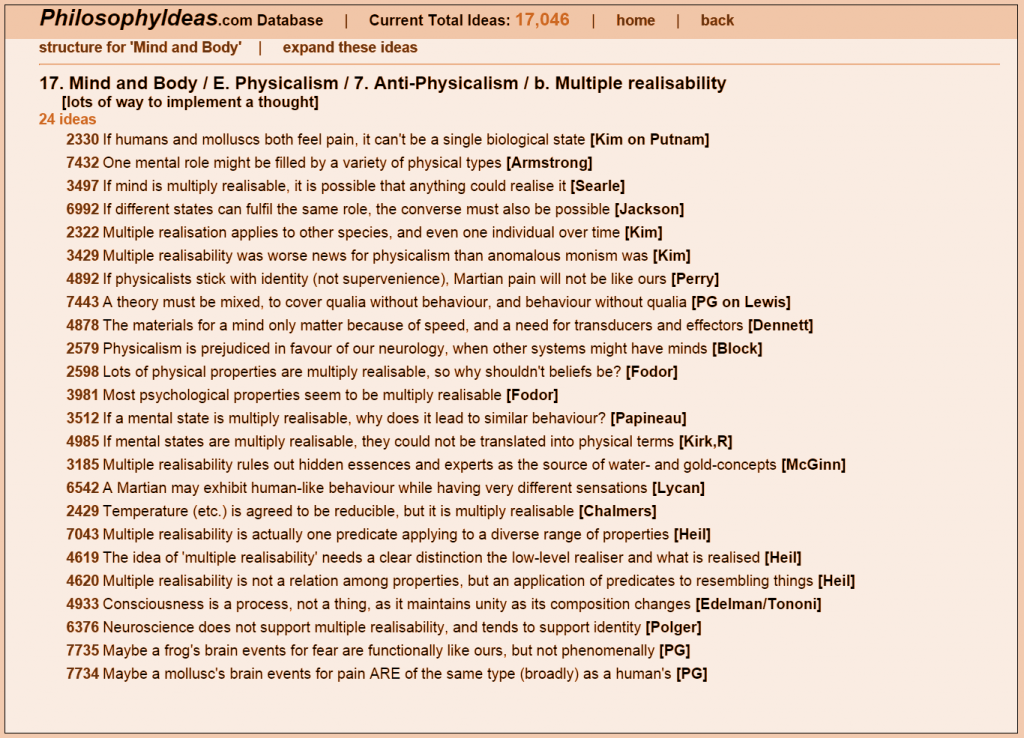A Database of Philosophical Ideas
PhilosophyIdeas is a searchable database of philosophical ideas compiled by Peter Gibson and built by Martin Berry. Users can search and sort ideas by theme, author, and text. The site has been around for years, but somehow escaped my attention until recently when I saw a tweet from Gibson: “Latest upload. Now over 17,000 philosophical ideas in the catalogue, each one of them a potential life-changer.” 17,000 ideas. That’s a lot of work.
From a page explaining the site:
The big thought behind the project is that philosophy has became such a vast and specialised subject during the last hundred years that not even the most learned student can keep track of it. The obvious next step seems to be the production of a clear and comprehensive map of what has been achieved. PhilosophyIdeas is meant as a tiny contribution to that task, though it began as a tool for helping students to write essays.
If you click on “explore the structure” and drill down a few levels, you can get a sense of how the site is organized. For example:
Start at the explanation page, check out the advice page, and have fun.
Also see the Indiana Philosophy Ontology (InPhO) Project.



From just looking at the “24 ideas” on this example page, I am struck by the narrowness of the spectrum, how small the number of members of the group of idea-originators on this specialized topic, how difficult it presumably must be for paradigm-challenging ideas, coming from individuals outside of this small group of most-cited authors, to break the surface of collective philosophical consciousness. Will this database serve as a “comprehensive map of what has been achieved,” or serve to block future achievement?
A few things. First, let’s recognize that this enormous database was put together by one person for the rest of the world to use, and appreciate the time and effort that went into this project, before launching into criticism. Second, the “narrowness” of the sample is at least in part a reflection of the narrowness of the subject matter being looked at — I’ve drilled down several levels to get to Section 17.E.7.b! Third, when making a criticism of this sort, it would be much more helpful to include who, specifically, or what, specifically, you think is missing.
I believe Ronnie had alluded to a comprehensive account of these individual topics, as given many times in open-access encyclopedias (e.g., wikipedia). Moreover, from what I read, formal logic (e.g., relevance logic) is greatly expanded upon (even in preliminary sections) in the cited works (e.g., Burgess, Beall, etc.) Perhaps, the users wish for an eventual encyclopedic entry for each article to resemble the comprehension of most encyclopedia entries (and not just stubs, very short summaries or, with the cited works, the book itself). A suggestion is in order: maybe a team of experts in each field can contribute their knowledge of said fields and use popular and comprehensive books and articles to lay out thorough entries, whose ordering in the structure of ideas can be immensely helpful for undergraduates and graduate students of philosophy, history, the classics and computer science. The students who view and read these pages across the globe can offer editorial suggestions to be considered by the professor(s) who wrote and continually edit the pages for accuracy and updates. This, I think, would stir a revolution as, I think, SEP has done lately. However, I must commend you on the initialization of the many philosophical ideas which are to be eagerly viewed and expanded upon. Thank you, Peter Gibson and Martin Berry.
The database is very impressive. Thank you to all who have given time towards creating it.
A few brief thoughts:
1) This is pretty great. In a couple of fun minutes of browsing, I came across a bunch of interesting ideas in areas I thought I knew quite well. I like Camus and I’m interested in the philosophy of love, but I never knew that Camus said “The more one loves the stronger the absurd grows.” Obviously it’s imperfect in all kinds of ways, but I can imagine this being useful for all sorts of things.
2) It’s kind of incredible that one person put this together. What strikes me is the complete absence of any kind of agenda – this isn’t someone trying to grind any particular axe or put forward any particular view, but just doing his best to understand a massive range of stuff. I love the occasional “reactions” that you get to certain ideas – it feels like peeking into someone else’s notebook.
3) Is it worth thinking about trying to make this into a Wiki? If it were possible for users to submit their own content, perhaps with some degree of moderating (maybe even through a simple submission form?), this could grow into something pretty huge and potentially very useful.